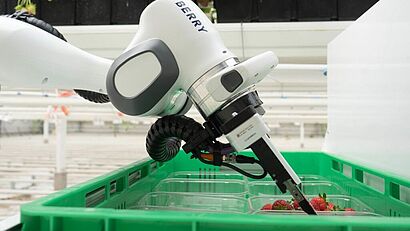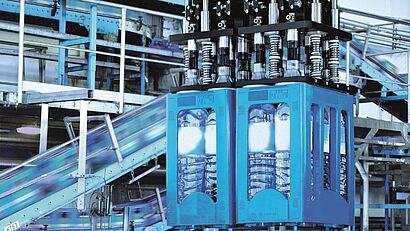THE FUTURE OF THE FOOD INDUSTRY
FULLY AUTOMATED FROM THE FIELD TO THE PLATE
The food industry is undergoing radical change and is facing a transformation due to increasing automation. For years, the Zimmer Group has been observing the challenges facing the industry and how automated processes are changing the market. The company is responding with components, systems and complete plants that help to process, package and transport food safely and reliably.
The Zimmer Group has already developed and implemented a large number of individual components and system solutions for various customers in the food industry. The areas of application are diverse. For example, a standard angular gripper from the GK series was modified at the customer's request so that it can grip a muffin and dip it in liquid chocolate. The prerequisite for this application was that the gripper jaws were made of stainless steel and that food-safe grease was used as a lubricant.
The production of yoghurt pots was improved for another customer. Robots remove the cups from the thermoforming machines and pack the white cups into cartons. Two different cup sizes have to be taken into account. The solution was a cavity gripper that removes a block of cups from the thermoformer. Another end effector then removes these cups in rows and places them in cartons. The cups are then removed from the carton and printed. The system solution comprises a total of 16 robot grippers.
There is also a solution for the logistics of the beverage crates. The specially developed system enables crates and bottles to be gripped in order to load and unload pallets quickly and efficiently. The gripper distance or gripper path can be individually adjusted, and Z-compensation serves as collision protection.
HYGIENIC DESIGN IS THE BE-ALL AND END-ALL
When it comes to automation in the food industry, hygiene is a particularly important factor. In order to meet the highest hygiene standards, grippers, robots and accessories must meet special requirements. Keyword: hygienic design. This means that all components must be designed in such a way that they are easy to clean and no dirt or bacteria can accumulate. Special materials such as stainless steel, PEEK or PET are particularly in demand here. The grippers must also be designed in such a way that there are no cavities in which dirt can accumulate.
FULLY AUTOMATED: THE GEP2000 SERIES IS USED FOR THE MYAPPCAFÉ BARISTA ROBOT.
In addition, the use of H1 greases as food-grade lubricants is crucial for safety and quality in the F&B market. This type of grease has been classified by the Food and Drug Administration (FDA) specifically for this industry. The Zimmer Group has responded to these increased requirements with a Protector variant of the GEP2000 series, for example. The electric small parts grippers are lubricated with food-safe H1 grease, protected against corrosion and equipped with sealed guides, making them suitable for use in the food industry.
In addition to the hygienic requirements, the end effectors must also meet the demands for flexibility, robustness and safety. Different shapes, sizes, surfaces and production environments require intelligent, adaptable components and gripping systems. In order to be able to reliably detect and safely grip different products, the GEP2000 series has integrated position detection, which enables additional quality assurance in the process.
Standard values for workpieces, including tolerances, can be stored in the gripper. Deviations in the product are then immediately detected by the gripper. The small parts gripper is available in digital I/O and IO-Link versions. The latter enables particularly convenient control and integration into the system. The standard mechanical self-locking mechanism also ensures a secure hold even in the event of a power failure or emergency stop.
FROM THE STRAWBERRY FIELD TO THE TABLE
Robots can help food companies to ensure hygienic, safe and efficient processes, and not just in the warehouse and in production. Automation has also found its way into the field: The start-up company Organifarms uses a GEP2000 gripper from the Zimmer Group for its robot specially developed for harvesting strawberries. The electric gripper picks the ripe berries. Thanks to precise and intelligent position detection, it only opens just before the fruit. This prevents damage to the fruit or the plant. The gripper fingers specially developed by Organifarms enable simultaneous cutting and holding. The upper part of the stalk is cut off and the lower part is clamped so that the fruit is held securely. The big advantage: the strawberry is not touched and there are no pressure points. Instead, the robot gently places the fruit in a tray.
AUTOMATION SOLUTIONS THAT CARRY FRUIT
The small parts gripper is also used in the fully automated barista robot MyAppCafé. In collaboration between restaurateur Michael Stille, the company IBS and the Zimmer Group, a robot solution was developed that serves freshly prepared coffee specialties. One challenge is gripping different cup sizes, for which the electric two-jaw parallel gripper GEP2013IO-00-A was selected. Another tricky aspect is that the cups are stacked rotated in the robot cell. In order to remove them, a resistance in the form of a rubber ring on the edge of the cup must be overcome. Gripping can therefore only be achieved by pure force closure. After selecting a suitable gripper, IBS developed the corresponding gripper jaws. Once these had been produced using 3D printing and tested in several validation loops, an output unit was developed, custom software for communication and control of all components involved was written and finally the robot was programmed.
CONCLUSION: SAVING TIME, MONEY AND RESOURCES
Automation technology offers many advantages in the food industry thanks to intelligent and hygienic end-of-arm tools. Processes are accelerated, productivity is increased and quality is improved. Cost savings and fewer errors are further advantages. As in other sectors, automation and robot support will continue to increase in the food industry. The Zimmer Group is actively shaping this development with components, systems and complete plants for the food industry.



